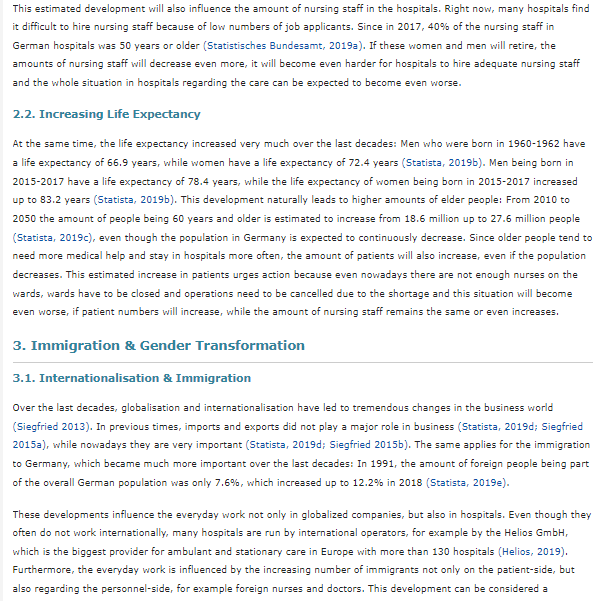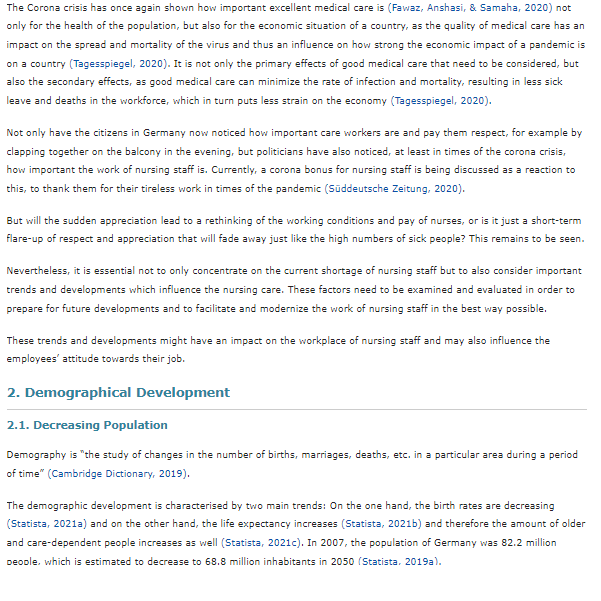Outline the context and intended audience source for this article.
Chapter17: Advertising And Public Relations
Section17.2: Greenwashing Harms Companies And Consumers
Problem 2C
Related questions
Question
Outline the context and intended audience source for this article. Provide a statement of the authors purpose and the change the author wants to effect in the audience.

Transcribed Image Text:This estimated development will also influence the amount of nursing staff in the hospitals. Right now, many hospitals find
it difficult to hire nursing staff because of low numbers of job applicants. Since in 2017, 40% of the nursing staff in
German hospitals was 50 years or older (Statistisches Bundesamt, 2019a). If these women and men will retire, the
amounts of nursing staff will decrease even more, it will become even harder for hospitals to hire adequate nursing staff
and the whole situation in hospitals regarding the care can be expected to become even worse.
2.2. Increasing Life Expectancy
At the same time, the life expectancy increased very much over the last decades: Men who were born in 1960-1962 have
a life expectancy of 66.9 years, while women have a life expectancy of 72.4 years (Statista, 2019b). Men being born in
2015-2017 have a life expectancy of 78.4 years, while the life expectancy of women being born in 2015-2017 increased
up to 83.2 years (Statista, 2019b). This development naturally leads to higher amounts of elder people: From 2010 to
2050 the amount of people being 60 years and older is estimated to increase from 18.6 million up to 27.6 million people
(Statista, 2019c), even though the population in Germany is expected to continuously decrease. Since older people tend to
need more medical help and stay in hospitals more often, the amount of patients will also increase, even if the population
decreases. This estimated increase in patients urges action because even nowadays there are not enough nurses on the
wards, wards have to be closed and operations need to be cancelled due to the shortage and this situation will become
even worse, if patient numbers will increase, while the amount of nursing staff remains the same or even increases.
3. Immigration & Gender Transformation
3.1. Internationalisation & Immigration
Over the last decades, globalisation and internationalisation have led to tremendous changes in the business world
(Siegfried 2013). In previous times, imports and exports did not play a major role in business (Statista, 2019d; Siegfried
2015a), while nowadays they are very important (Statista, 2019d; Siegfried 2015b). The same applies for the immigration
to Germany, which became much more important over the last decades: In 1991, the amount of foreign people being part
of the overall German population was only 7.6%, which increased up to 12.2% in 2018 (Statista, 2019e).
These developments influence the everyday work not only in globalized companies, but also in hospitals. Even though they
often do not work internationally, many hospitals are run by international operators, for example by the Helios GmbH,
which is the biggest provider for ambulant and stationary care in Europe with more than 130 hospitals (Helios, 2019).
Furthermore, the everyday work is influenced by the increasing number of immigrants not only on the patient-side, but
also regarding the personnel-side, for example foreign nurses and doctors. This development can be considered a

Transcribed Image Text:The Corona crisis has once again shown how important excellent medical care is (Fawaz, Anshasi, & Samaha, 2020) not
only for the health of the population, but also for the economic situation of a country, as the quality of medical care has an
impact on the spread and mortality of the virus and thus an influence on how strong the economic impact of a pandemic is
on a country (Tagesspiegel, 2020). It is not only the primary effects of good medical care that need to be considered, but
also the secondary effects, as good medical care can minimize the rate of infection and mortality, resulting in less sick
leave and deaths in the workforce, which in turn puts less strain on the economy (Tagesspiegel, 2020).
Not only have the citizens in Germany now noticed how important care workers are and pay them respect, for example by
clapping together on the balcony in the evening, but politicians have also noticed, at least in times of the corona crisis,
how important the work of nursing staff is. Currently, a corona bonus for nursing staff is being discussed as a reaction to
this, to thank them for their tireless work in times of the pandemic (Sūddeutsche Zeitung, 2020).
But will the sudden appreciation lead to a rethinking of the working conditions and pay of nurses, or is it just a short-term
Flare-up of respect and appreciation that will fade away just like the high numbers of sick people? This remains to be seen.
Nevertheless, it is essential not to only concentrate on the current shortage of nursing staff but to also consider important
trends and developments which influence the nursing care. These factors need to be examined and evaluated in order to
prepare for future developments and to facilitate and modernize the work of nursing staff in the best way possible.
These trends and developments might have an impact on the workplace of nursing staff and may also influence the
employees' attitude towards their job.
2. Demographical Development
2.1. Decreasing Population
Demography is "the study of changes in the number of births, marriages, deaths, etc. in a particular area during a period
of time" (Cambridge Dictionary, 2019).
The demographic development is characterised by two main trends: On the one hand, the birth rates are decreasing
(Statista, 2021a) and on the other hand, the life expectancy increases (Statista, 2021b) and therefore the amount of older
and care-dependent people increases as well (Statista, 2021c). In 2007, the population of Germany was 82.2 million
Deople. which is estimated to decrease to 68.8 million inhabitants in 2050 (Statista. 2019a).
Expert Solution
This question has been solved!
Explore an expertly crafted, step-by-step solution for a thorough understanding of key concepts.
Step by step
Solved in 2 steps

Recommended textbooks for you

